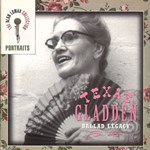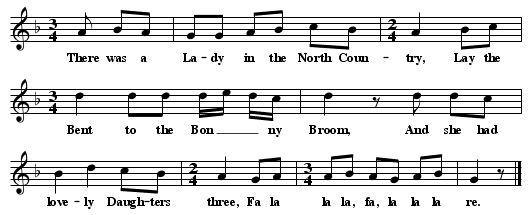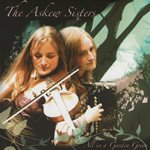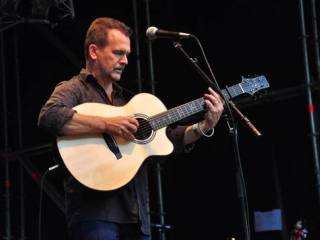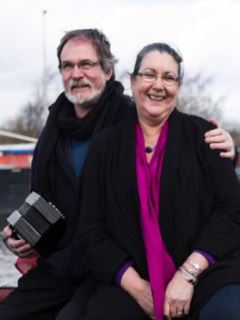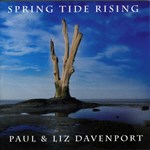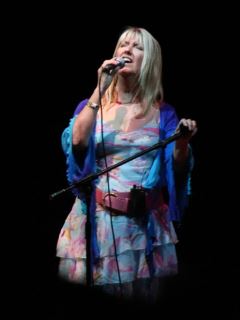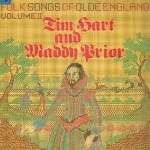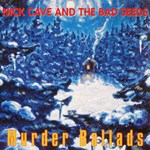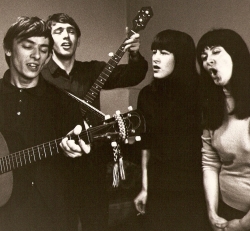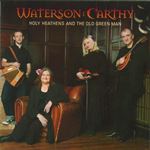FolkWorld #70 11/2019
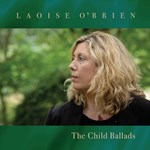
Tracklist:
The Three Ravens (Child #26) |
The Cherry Tree Carol (#54) |
Johnny Cock (#114) |
Kempy Kane (#33) |
Get Up and Bar the Door (#275) |
The Faulse Ladye (#68) |
The Daemon Lover (#243) |
The Wee Wee Man (#38) |
The
Unquiet Grave (#78) |
The Devil's Nine Questions (#1 Riddles
Wisely Expounded)

Laoise O'Brien The Child Ballads, Jiggery Pokery Productions, 2018

The Child Ballads
Singer Laoise O'Brien showcases a selection of the Child Ballads from an Irish point of view.
Let's have a look at three pieces, Child ballad #1 (Riddles Wisely Expounded a.k.a. The Devil's Nine Questions),
#68 (The Faulse Ladye a.k.a. Young Hunting)
and last but not least, due to the Christmas season, #54 (The Cherry Tree Carol).
Riddles Wisely Expounded
"Riddles Wisely Expounded" is a traditional English song, dating at least to 1450. It is Child Ballad 1 and Roud 161, and exists in several variants. The first known tune was attached to it in 1719.
Synopsis
In the earliest surviving version of the song, Inter diabolus et virgo, "between the devil and the maiden" (mid-15th century), the "foul fiend" proposes to abduct a maiden unless she can answer a series of riddles. The woman prays to Jesus for wisdom, and answers the riddles correctly.
In later versions, a knight puts a woman to test before he marries her (sometimes after seducing her), or a devil disguised as a knight tries to carry her off. The woman knows the answers, and thus either wins the marriage or is free of the devil. In the latter case, the last riddle is often "what is worse than woman?" (the devil).
The riddles vary, but typical ones include
- What is longer than the way? -- love
- What is deeper than the sea? -- hell
- What is louder than the horn? -- thunder
- What is sharper than a thorn? -- hunger
- What is whiter than milk? -- snow
- What is softer than silk? -- down
Sophie Crawford sang 99 & 90 on her 2018 album Silver Pin.
The motif of riddling in folklore is very ancient, the stories of Oedipus and Samson giving two early examples. The particular form used here matches the folktale Aarne-Thompson type 875 The Clever Girl where a woman wins a husband by her clever answers to riddles. Other tales of this type include What Is the Fastest Thing in the World? and The Wise Little Girl.
In this ballad, the words of each verse are interspersed with a chorus phrase "lay the bent to the bonny broom". A. L. Lloyd euphemistically describes this as a phrase of "physiological significance", explaining that the word "bent" means a horn. "Broom" most likely refers to the flowering shrub.
There are many German variants of this ballad, and a Gaelic form was widespread among both Scots and Irish.
Modern retellings
|
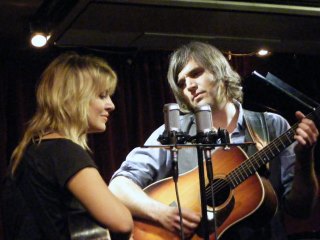
There were three sisters in the north
Lay the bend to the bonny broom
And they lived in their mother's house
And you'll beguile a lady soon
There came a man one evening late
And he came knocking at the gate
The eldest sister let him in
And locked the door with a silver pin
The second sister made his bed
And laid soft pillows 'neath his head
The youngest sister, fair and bright
She lay beside him all through the night
And in the morning, come the day
She said, "Young man, will you marry me?"
And he said, "Yes, I'll marry thee
If you can answer this to me"
"What is greener than the grass?
And what is smoother than the glass?"
"What is louder than a horn?
And what is sharper than a thorn?"
"What is deeper than the sea?
And what is longer than the way?"
"Envy's greener than the grass
Flattery's smoother than the glass"
"Rumor's louder than a horn
Slander's sharper than a thorn"
"Regret is deeper than the sea
But love is longer than the way"
|
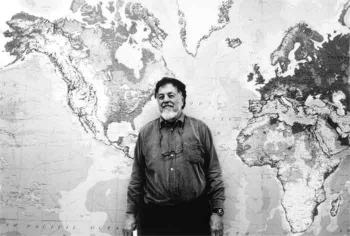 Texas Gladden of Salem, Virginia, sang The Devil's Nine Questions in August 1941 to Alan Lomax. This recording was included in 2001 on her Rounder anthology in the Alan Lomax Collection, Ballad Legacy. The album's booklet noted:
»This is an extremely rare ballad and is the first in Child’s canon. Alfreda Peel collected it in 1922 and then taught it to Texas Gladden. As in other ballads, the devil is present and personified, and referred to as meaner than womankind (a theme also found in The Devil and the Farmer’s Wife).«
Texas Gladden of Salem, Virginia, sang The Devil's Nine Questions in August 1941 to Alan Lomax. This recording was included in 2001 on her Rounder anthology in the Alan Lomax Collection, Ballad Legacy. The album's booklet noted:
»This is an extremely rare ballad and is the first in Child’s canon. Alfreda Peel collected it in 1922 and then taught it to Texas Gladden. As in other ballads, the devil is present and personified, and referred to as meaner than womankind (a theme also found in The Devil and the Farmer’s Wife).«

|
Young Hunting

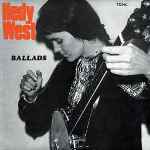
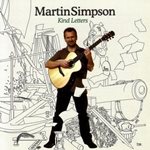
"Young Hunting" is a traditional folk song, Roud 47, catalogued by Francis James Child as Child Ballad number 68, and has its origin in Scotland. Like most traditional songs, numerous variants of the song exist worldwide, notably under the title of "Henry Lee" and "Love Henry" in the United States and "Earl Richard" and sometimes "The Proud Girl" in the United Kingdom.
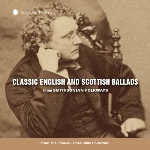
Ella Parker, vocal
Roud 47; also known as “Henry Lee,” “Love Henry,” “The Proud Girl,” “Earl Richard,” “Young Hunting”;
recorded by Pat Dunford, July 20, 1964, Franklin County, Indiana)
»This is another ballad dealing with a love triangle gone wrong. The male protagonist decides he is going to marry another, more beautiful woman, and the spurned lover kills him, tossing his body into the river. After many protestations of her innocence, she confesses and is burned at the stake.
The song is a Scottish ballad, at least as old as the 18th century, although Child found a ballad with a similar plot line in Scandinavia. It was one of the first songs on the well-known Anthology of American Folk Music, appearing as “Henry Lee” and performed by Dick Justice from West Virginia. A later rearranged version of “Henry Lee” was recorded on the dark album Murder Ballads in 1996 by rockers nick Cave and P.J. Harvey.
The singer here was Ella Parker (1894–1982) from Indiana. Parker’s version never explains why the woman killed the lord. Another Child Ballad, “Lady Elizabeth and the Elf knight,” includes a bird which witnesses the crime and is bribed with a golden cage to maintain its silence. The bird makes an appearance here and, again, is paid off.«
"Classic English and Scottish Ballads from Smithsonian Folkways (from The Francis James Child Collection)",
Smithsonian Folkways, 2017
The song, which can be traced back as far as the 18th century, narrates the tale of the eponymous protagonist, Young Hunting, who tells a woman, who may have borne him a child, that he is in love with another, more beautiful woman. Despite this, she persuades him to drink until he is drunk, then to come to her bedroom, or at least kiss her farewell. The woman then stabs him to death. She throws his body in the river — sometimes with the help of one of the other women of the town, whom she bribes with a diamond ring — and is taunted by a bird. She tries to lure the bird down from the tree but it tells her that she will kill it if it comes within reach. When the search for Young Hunting starts, she either denies seeing him or claims that he left earlier, but when Hunting's remains are found, in order to revoke her guilt, she reveals that she murdered him and is later burned at the stake. Nick Cave, who covered the song, referred to the song as "a story about the fury of a scorned woman."
Variants and origins
American variants of the song are more widely known as the song has been physically released. One of the earliest recorded variants was performed by blues singer Dick Justice in 1929 under the title "Henry Lee." The recording was anthologised in the first of Harry Smith's Anthology of American Folk Music, released in 1952. Judy Henske included a version of the song titled "Love Henry" — a title collected by Cecil Sharp in September 1916 from Orilla Keeton in Mountfair, Virginia — on her eponymous debut album in 1963.
Version named "Love Henry" was included by Bob Dylan into his album World Gone Wrong in 1993. A version of this song was also recorded by Karen Casey and John Doyle in their 2010 album "Exiles Return" as "The False Lady."
English variants of the song, which are closely structured on the original Scottish versions, are also known under the titles "Earl Richard" and "The Proud Girl." A version of the song, credited as "Earl Richard", was recorded by English folk singer Tim Hart in 1969 and its liner notes state: "[the song] [...] is a shorter version of the ballad 'Young Hunting.' [...] this version comes from Motherwell's Minstrelsy of the Scottish Border." John Spiers and Jon Bode recorded a version of the English variant in 2001 on the album Through & Through and credited the author as "Miss Stephenson of Glasgow" and said it was written in 1825. "The Proud Girl" is an arrangement of the song by A.L. Lloyd that was performed at the Top Lock Folk Club in Runcorn, Cheshire on November 5, 1972. This performance, which was the basis of Frankie Armstrong's 1997 version, was released in 2010 on An Evening with A.L. Lloyd, and was noted to have been traced back three generations further.
Related songs
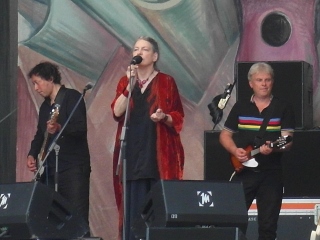
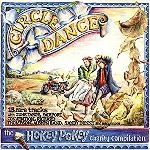
Then up and spoke a pretty little bird
Exceeding on a willow tree
You've got to sing a song with that in it! The bird flies away into the sunset to star in the sequel, while everybody else dies unhappily ever after.«
The song is closely related to another Child Ballad, "Young Benjie", as it not only deals with a similar theme, but almost identical story, in which a male lover is murdered and thrown in a river by his female companion. "Child Waters" and "The False Lover Won Back", both murder ballads and Child Ballads, are similar and all four songs may have the same origin.
Another similar song is "Lowe Bonnie," recorded by Jimmie Tarlton in 1930. It too is considered a variant of Child #68: Lowe Bonnie is described as a "hunting young man," he tells his "old true love" that he has a new woman, and she stabs him to death with a pen knife.
Nick Cave and the Bad Seeds version
"Henry Lee", a variant of "Young Hunting", is a song by the Australian post-punk band Nick Cave and the Bad Seeds. It is the third track and second single from the band's ninth studio album, Murder Ballads (1996), and was released on 26 February 1996 on Mute Records. The song, which features a duet between frontman Nick Cave and the English alternative rock musician PJ Harvey, is alternately–arranged in comparison to other more traditional versions of "Henry Lee." Lyrically, the song borrows heavily from Dick Justice's version of the song.
Recording
The majority of the studio version of "Henry Lee" was recorded by The Bad Seeds at Sing Sing Studios and Metropolis Studios in Melbourne with Cave's vocal track. Harvey's vocal track was recorded at Wessex and Worldwide Studios in London. A demo version of the song which was sent to Harvey featured Bad Seed member Blixa Bargeld performing guide vocals. The single's two b-sides are other American murder ballads, following the album's theme and do not feature Harvey. However, "Knoxville Girl" features James Johnston on acoustic guitar.
Music video
Directed by Rocky Schenck, and produced by Nick Verden for Atlas Films, the promotional music video for "Henry Lee" features one scene throughout; Nick Cave, in the role of Henry Lee, and PJ Harvey, in the role of his lover, singing the duet. There is a constant green backdrop in the background of the video. This format contrasted the former format used by Schenck for "Where the Wild Roses Grow" which focused on cinematography and featured several scenes. Body language is a stand-out feature of the video and after many varying forms of it, the pair slow dance at the end of the video.
|

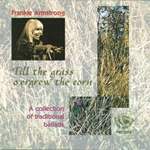 |
Paul and Liz Davenport sang Young Hunting in 2011 on their CD Spring Tide Rising. They noted:
»This version is from Sharp's English Folk Songs from the Southern Appalachians. It's a simple and economic telling of the story in which a young man discovers that ‘hell hath no fury like a woman scorned’. Generally, it's not a great idea to tell one's lover that she's the one who's unfaithful. Neither is it too smart to compound this by telling her that your wife is better looking than ten of her. Unsurprisingly it all ends in tears—frankly, it serves him right!«
|
Tim Hart and Maddy Prior recorded a much shorter form with the name Earl Richard in 1969 for their second duo album, Folk Songs of Old England Vol. 2. The record's sleeve notes comment:
»This song concerns the murder of Earl Richard by his jealous lover. In the latter stanzas a bird speaks to the murderess, and while this could be a reference to the transfiguration of the soul of her victim, it is more probable that the bird plays an innocent role, since speaking birds like the mythological phoenix in earlier times and later the parrot, are universal as messengers throughout folklore.«
|
The Cherry Tree Carol
Waterson:Carthy recorded The Cherry Tree Carol for their 2006 album Holy Heathens and the Old Green Man. Martin Carthy commented in the album's sleeve notes:
»The Apocryphal Gospels are full of all sorts of stories about the Christ Child; stories of miracles performed as a child, and, in the case of The Cherry Tree Carol, pre partum from the womb. The tune comes from the Mr Robert Hughes, who was in Buckingham Workhouse, and the words, for the most part, from a Mr Thomas in Camborne in Cornwall and the two sit next to each other in Maud Karpeles' fine two volume set of selections from Cecil Sharp's manuscripts.«
"The Cherry-Tree Carol" is a ballad with the rare distinction of being both a Christmas carol and one of the Child Ballads (no. 54). The song itself is very old, reportedly sung in some form at the Feast of Corpus Christi in the early 15th century.
Synopsis
The ballad relates an apocryphal story of the Virgin Mary, presumably while traveling to Bethlehem with Joseph for the census. In the most popular version, the two stop in a cherry orchard, and Mary asks her husband to pick cherries for her, citing her child. Joseph spitefully tells Mary to let the child's father pick her cherries.
At this point in most versions, the infant Jesus, from the womb, speaks to the tree and commands it to lower a branch down to Mary, which it does. Joseph, witnessing this miracle, immediately repents his harsh words. The more contemporary versions sometimes end here, while others often include an angel appearing to Joseph and telling him of the circumstances of Jesus's birth. Other versions then jump ahead several years, where the next verse picks up with Jesus on his mother's lap, telling her of his eventual death and resurrection.
Sources
The story is derived from the apocryphal Gospel of Pseudo-Matthew, written around the year 650, which combines many earlier apocryphal Nativity traditions; however, in Pseudo-Matthew, the event takes place during the flight into Egypt, and the fruit tree is a palm tree (presumably a date palm) rather than a cherry tree. In the apocryphal Gospel, Jesus has already been born and so Joseph's truculence is unrelated to any dismay over Mary's pregnancy, but has to do with an inability to reach the fruits of the palm and a concern over the family's lack of water.
The carol is found in the “N-Town Plays,” performed in the English Midlands around 1500. Having developed out of the folk tradition, there are a number of versions of text and tune.
Recordings
The song has been recorded by Shirley Collins & Davy Graham (also by herself and with The Young Tradition), Marty Haugen, and Kacy & Clayton, It was popularized in the 60s by Joan Baez.
It has also been recorded by the Clancy Brothers (as "When Joseph Was an Old Man"), Judy Collins, José Feliciano, Emmylou Harris, Mary Hopkin (as B-side of the single "Mary had a Baby/Cherry Tree Carol"), the King's College Choir, Cindy Kallet, Magpie Lane, Mark Lanegan, Colin Meloy, the Chad Mitchell Trio, Nowell Sing We Clear, Pentangle, Angelo Branduardi (two italian versions: "Il ciliegio" and "Rosa di Galilea"), Peter Paul and Mary, Jean Ritchie, Casey Stratton, Bob Rowe, John Rutter (with the Cambridge Singers), the Poor Clares from New Orleans ("Cherry Tree Carol" on their album Songs for Midwinter), Sting (If on a Winter's Night), and Kerfuffle (as "Cherry Tree Carol" on their Midwinter album Lighten the Dark).
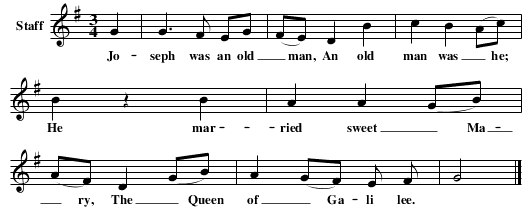

 Listen to The Cherry Tree Carol from:
Belshazzar's Feast, Broom Bezzums, Kerfuffle, Little Windows,
Morris Open, Emily Sanders, Chris Parkinson & Pete Morton, ...
Listen to The Cherry Tree Carol from:
Belshazzar's Feast, Broom Bezzums, Kerfuffle, Little Windows,
Morris Open, Emily Sanders, Chris Parkinson & Pete Morton, ...
 Watch The Cherry Tree Carol from:
Judy Collins, Kerfuffle, Mark O'Connor,
Lyrics (© Mainly Norfolk): The Cherry Tree Carol
Watch The Cherry Tree Carol from:
Judy Collins, Kerfuffle, Mark O'Connor,
Lyrics (© Mainly Norfolk): The Cherry Tree Carol
From Wikipedia, the free encyclopedia
[en.wikipedia.org/wiki/Riddles_Wisely_Expounded,
en.wikipedia.org/wiki/Young_Hunting,
en.wikipedia.org/wiki/The_Cherry-Tree_Carol].
Wikipedia® is a registered trademark of the Wikimedia Foundation, Inc., a non-profit organization.
Text is available under the Creative Commons Attribution-ShareAlike License.
Date: October 2019.
Photo Credits:
(1) Child Ballads Ireland,
(2) Laoise O'Brien,
(3) Sophie Crawford,
(4) Anaïs Mitchell & Jefferson Hamer,
(5) Alan Lomax,
(7) Hedy West,
(10) Frankie Armstrong,
(11) Paul and Liz Davenport,
(12) Maddy Prior,
(14) The Watersons
(unknown/website);
(6) 'Riddles Wisely Expounded',
(13) 'The Cherry Tree Carol',
(by ABC Notations);
(8) Martin Simpson,
(9) June Tabor
(by Walkin' Tom).
FolkWorld - Home of European Music
 Layout & Idea of FolkWorld © The Mollis - Editors of FolkWorld
Layout & Idea of FolkWorld © The Mollis - Editors of FolkWorld






